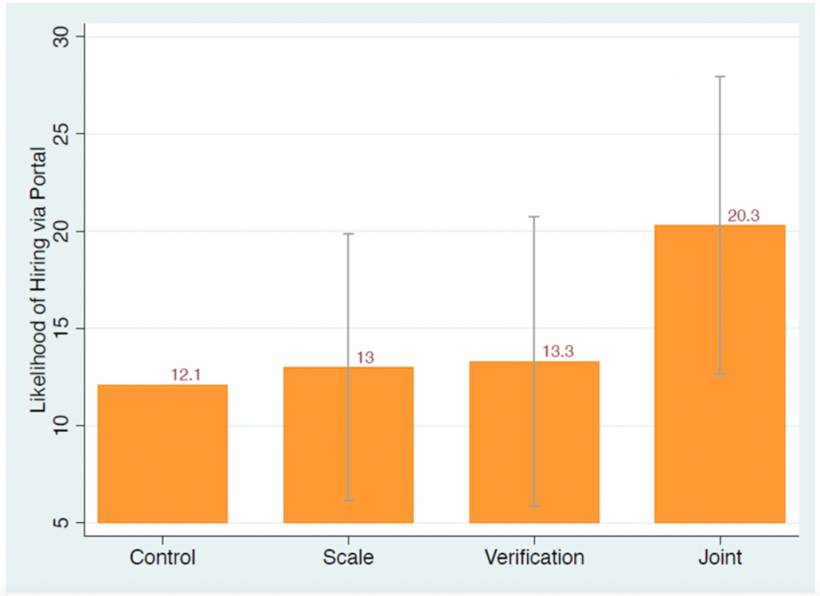
How online job portals can help smaller firms hire top talent
Firms typically rely on hiring from networks as they can provide valuable information on candidates, but it could also limit the pool of applicants. Online job portals can help smaller firms reach a wider pool of qualified candidates, but are these firms willing to hire these unfamiliar applicants?
Costs associated with finding and screening job candidates affect firms' ability to hire and grow efficiently. To ease these hiring frictions, firms often resort to hiring from networks of friends, family, co-workers, and their referrals. However, limiting the applicant pool to social networks may constrain the quality and quantity of applicants particularly for smaller firms. Online job portals can expand applicant pools, but smaller firms may find it difficult to attract applicants due to their relative anonymity and may themselves remain wary of hiring strangers. Could recruitment services that allow firms to find and screen applicants increase hiring outside of networks?
Evaluating the impact of recruitment services on hiring outside of networks
We conduct a randomised experiment on an Indian job portal to study the impacts of providing recruitment services on hiring outside of networks for firms reporting fewer than 50 employees. The portal, QuikrJobs, specialises in recruitment for low-wage services and retail sectors. We sample firms posting vacancies in Bengaluru, a large urban labour market and assign 1,719 vacancies to one of three treatments: Scale, Verification, and Joint.
- Scale provides a vacancy with access to advertising services that improves its visibility to job seekers.
- Verification offers employers verified background information on applicants. Job seekers to all experimental vacancies receive a request for identity verification after their application. They choose whether to comply and, under this treatment, their verification compliance and outcomes are revealed to employers.
- Joint combines both Scale and Verification. It allows us to test the effects of alleviating multiple frictions at once and helps us examine potential complementarities between treatments.
We combine administrative portal data on vacancies and jobseekers and original surveys with firms to understand how these treatments affect the recruitment and hiring processes.
The effects of recruitment services on hiring
Advertising doubles applications, without changing the average quality of the applicant pool
Vacancies receiving advertising services receive more than double the number of applications relative to control (50-55 applications in Scale and Joint versus 25 in control). Yet, the average skill composition of applicants, as measured by applicant profile information on education, skills, experience, and other qualifications, is the same across the groups. This suggests advertising works to attract applicants by changing the salience of vacancies, rather than perceptions of job or employer quality. While the average skill composition is unchanged, the larger applicant pools do provide firms with access to more skilled applicants.
When employers receive advertising, verification services increase their engagement with applicants
On the portal, we observe employer clicks used to initiate contact with applicants. Using these data, we find that firms in the Scale and Joint treatment groups increase the number of unique applicants with whom they engage by 68% and 147%, respectively, relative to control. The difference between Scale and Joint is statistically significant, suggesting employers valued the additional information provided by identity verification.
Advertising and verification services, when used together, increase hiring from the portal, leading to more overall hiring
Relative to the 12% of firms in control who hire through the portal, we find that 20% of firms assigned the Joint treatment make a hire through the portal, an increase of 67%. In contrast, we are unable to detect hiring impacts for Scale or Verification alone, though we cannot rule out small positive effects. The increase for Joint firms does not appear to come at the expense of hiring through networks and leads to an overall increase in the likelihood of hiring by 11%. This hiring is not transient, as six months post-treatment, Joint firms are still more likely to report the presence of a portal-sourced hire.
Figure 1: Likelihood of hiring through the portal

Notes: The graph shows the likelihood of hiring through the portal across the experimental groups (Control, Scale, Verification, and Joint). The likelihood of hiring is significantly higher only for the Joint treatment relative to the control group.
Easing multiple hiring frictions is necessary for encouraging greater hiring outside of networks
Why do the individual treatments have muted impacts? First, while the Scale treatment increased the number of applicants, it did not provide employers with any additional resources to screen applicants. Employers may thus have been too overwhelmed by the higher volume of applications or continued to have concerns about unobservable attributes of workers, such as trustworthiness.
On the other hand, the Verification treatment provided access to verification information, but did not change the applicant pool relative to the control group. Given the voluntary nature of verification however, employers on average only received additional information on a small number of applicants (roughly 5 out of 25 applicants). This may simply have been too little to induce hiring from the portal.
In contrast, under the Joint treatment, employers had access to more skilled applicants and better information about them. Consequently, employers may have been better able to process their numerous applicants and in doing so were willing to hire unfamiliar applicants from the portal.
These results suggest that the value of verification services may therefore depend on the size and composition of applicant pools. In our context, easing multiple frictions may therefore be necessary to induce greater hiring outside of networks.
Supporting adoption of internet-based recruitment services has the potential to improve labour market matching for smaller firms
In this study, we show that verification services are necessary for encouraging greater hiring from job portals. We also provide evidence that easing hiring frictions on portals can lead to increased overall hiring. One implication of this is that supporting adoption of internet-based recruitment services, especially those that enable the screening of unfamiliar candidates, has the potential to improve labour market matching for smaller firms. As these firms which are reliant on traditional recruitment networks learn about the quality of the external labour market, such technologies could encourage firm growth and improve welfare.

